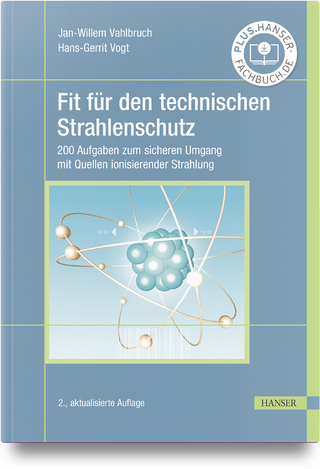
Chemistry of High-Energy Biopolymer-Based Nanocomposites
Elsevier - Health Sciences Division (Verlag)
9780323898409 (ISBN)
- Noch nicht erschienen
- Versandkostenfrei
- Auch auf Rechnung
- Artikel merken
The book begins by explaining the fundamentals of bionanocomposites, the use of cellulose, cellulose derivatives, and lignocellulose as fillers, the chemistry of energy-rich polymer bionanocomposites, and the design of composite architectures. Innovative methods in chemical modification, characterization, and analysis, are then presented in detail, including scattering studies, Fourier infra-red spectroscopy, thermogravimetric analysis, differential scanning calorimetry, mechanical properties, microscopy studies, and rheological studies. This is followed by chapters focusing on specific properties and cutting-edge areas of application, including fire retardancy, electro properties, capacitors for energy storage, and cellulose and synthetic polymer blends as nanocomposites for auxiliary solid fuel. Finally, the book reviews recycling of biopolymer-based nanocomposites, the energy rich concept driving the bionanocomposites approach, and future perspectives and outlook.
This is a valuable resource for researchers, scientists, and advanced students in bio-based polymers, composites, and nanocomposites, polymer science, nanotechnology, chemistry, chemical engineering, materials science, and engineering, as well as R&D professionals, scientists, and engineers interested in bio-based nanocomposite materials for a range of advanced applications.
Prof. Sabu Thomas is a renowned professor who is serving as the Vice-Chancellor of Mahatma Gandhi University, Kerala, India. He is also a full professor of Polymer Science and Engineering at the School of Chemical Sciences, a role which he has held since 1998. He was previously Pro-Vice Chancellor of Mahatma Gandhi University 2017-2018, Director of School of Chemical Science during 2010-2013, Hon. Director of International & Inter-University Centre for Nanoscience and Nanotechnology 2009-2015 and 2016-17. In 2015, Prof. Thomas received his first Docteur Honoris Causa from University of Souther Brittany in Lorient, France. In 2016, he received his second Doctorate honoris causa from University of Lorraine, France. He was awarded the Fellow of the Royal Society of Chemistry, London, FRSC in 2012. He received the Bronze Medal of the Chemical Research Society of India and the MRSI Medal of the Material Research Society of India in 2013. He was the recipient of Fulbright-Nehru International Education Administrators Award 2017. He also received TRiLA Academician of the year 2018 award. Prof. Thomas has published more than 1000 publications, and more than 100 books. Prof. Vera V. Myasoedova is a scientist and Chief Research Fellow working at N.N.Semenov Federal Research Center for Chemical Physics of the Russian Academy of Sciences, and Expert of Russian Academy of Sciences, Moscow, Russian Federation. She is actively investigating in the area of polymer and biopolymer nanocomposite chemistry, and is specialized in physical chemistry of non-aqueous solutions of cellulose derivatives, and structure and thermodynamics of natural and synthetic polymers and their blends. With significant results in the area of nano-polymers and bionanocomposites based on recycled polymers, she is also experienced in fuel nano-composition based on lignocellulosic materials mixed with recycled polymers as low density polyethylene, polypropylene, polystyrol, and other synthetic polymers as alternative for RDF fuels and natural gas in cement industry, and has developed filled non-chlorinated polymer compositions bas?d on synthetic rubbers and styrene, octene, and other copolymers. Prof. Myasoedova is author of 7 monographs published in Russian and one monograph book published in English, as well as 10 book chapters. She has also been listed in the “Who’s who of science in Russia.
1. Introduction to cellulose, derivatives, and lignocellulose as fillers in nanocomposites
2. Bio-nanocomposites based on agro-polymers and other natural polymers
3. Introduction to chemistry of energy-rich polymer bio-nanocomposites
4. Composite architecture design in polymer bio-nanocomposites
5. High K polymer bio-nanocomposites
6. Scattering studies in bio-nanocomposites
7. Fourier Infra-red spectroscopy studies of bio-nanocomposites
8. Thermogravimetric analysis of bio-nanocomposites
9. Differential scanning calorimetry in bio-nanocomposites
10. Mechanical properties of bio-nanocomposites
11. Microscopy studies of bio-nanocomposites
12. Rheological studies of cellulose and derivatives in bio-nanocomposites
13. Physical chemistry of modern pyrotechnic smoke studies of bio-nanocomposites
14. Fire-retardancy of polymer bio-nanocomposites
15. Electro properties of polymer bio-nanocomposites
16. Bio-nanocomposites in capacitors for energy storage applications
17. Cellulose and synthetic polymer blends as nanocomposites for auxiliary solid fuel
18. Recycling of polymer bio-nanocomposites
19. The energy-rich concept and basic parameters that define the approach to high-energy bio-nanocomposites
20. Biopolymer-based nanocomposites: Future perspectives and outlook
| Erscheint lt. Verlag | 1.9.2023 |
|---|---|
| Zusatzinfo | Approx. 200 illustrations (30 in full color); Illustrations, unspecified |
| Verlagsort | Philadelphia |
| Sprache | englisch |
| Maße | 191 x 235 mm |
| Themenwelt | Naturwissenschaften ► Chemie ► Physikalische Chemie |
| Technik ► Maschinenbau | |
| ISBN-13 | 9780323898409 / 9780323898409 |
| Zustand | Neuware |
| Informationen gemäß Produktsicherheitsverordnung (GPSR) | |
| Haben Sie eine Frage zum Produkt? |
aus dem Bereich


